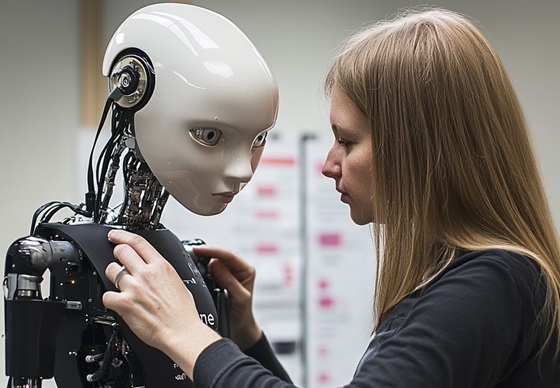A review paper published in Science Robotics explores the concept of the “sense of self” in humans and examines how robots can serve as tools to investigate this complex phenomenon. The interdisciplinary study brings together perspectives from cognitive robotics, psychology, and psychiatry, with contributions from Agnieszka Wykowska of the Istituto Italiano di Tecnologia (IIT) in Italy, Tony Prescott of the University of Sheffield in the UK, and Kai Vogeley of the University of Cologne in Germany.
The paper addresses the foundational human experience of selfhood—the intrinsic feeling of being a distinct, embodied entity capable of acting in the world. This sense encompasses the continuity of identity over time and the ability to perceive others as distinct selves. The authors propose that robots, as physically embodied entities, offer a dual approach to studying this phenomenon: as models of self-related processes and as experimental tools in psychological research.
One avenue discussed is the programming of robots to replicate processes thought to underlie the human sense of self, such as body ownership and agency—the sensation of controlling one’s actions. Current cognitive theories suggest that the human sense of self emerges from the brain’s interpretation of sensory experiences and its role in generating them. Robots, with their embodied presence and capacity for action, provide platforms to test these theories by simulating these processes in controlled environments.
The second approach involves using robots in social experiments. For example, researchers examine human interactions with robots that exhibit social behaviors, such as engaging in joint attention or conversational exchanges. Studies conducted by Wykowska’s group at IIT have shown that humans sometimes perceive robots as intentional agents, even developing a sense of joint agency during collaborative tasks. These experiments probe the extent to which humans extend social and self-related perceptions to robots, providing insights into the underlying cognitive mechanisms.
The review also considers the developmental trajectory of the sense of self in humans and its potential replication in robots. By age four, children typically recognize themselves as continuous entities and perceive others as having autonomous selves. Researchers are beginning to explore how similar features might be introduced into robots, such as memory systems akin to human autobiographical memory. However, current robotic systems lack the capacity for self-awareness or an understanding of others as distinct entities persisting over time.
The authors emphasize the relevance of robotics research for studying conditions where the sense of self is disrupted, such as schizophrenia or autism. By modeling these variations in robots, scientists hope to uncover fundamental aspects of self-perception and develop new insights into these conditions.
The paper outlines both the progress made and the challenges ahead in using robotics to deepen our understanding of the sense of self, paving the way for advances in cognitive science and human-robot interaction.

